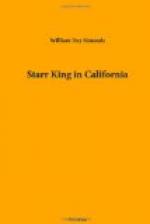The truth, half jesting, half in earnest flung;
The word of cheer, with recognition in it;
The note of alms, whose golden speech outrung
The golden gift within it.
But all in vain the enchanter’s wand we wave:
No stroke of ours recalls his magic vision:
The incantation that its power gave
Sleeps with the dead magician.”
Could Starr King have been given the privilege of selecting his poet-laureate we may be sure he would have named Whittier. For they were both lovers of nature and of man. Both earnest abolitionists, intensely patriotic, loving liberty and the rights of the humblest of God’s creatures, they were kindred spirits. So Whittier wrote not alone for New England, not alone for East and West, but from the deeps of his own loyal and gentle soul, as he penned, these beautiful lines:
“The great work laid upon his two-score years
It’s done, and well done. If we drop our
tears,
Who loved him as few men were ever loved,
We mourn no blighted hope nor broken plan
With him whose life stands rounded and approved
In the full growth and stature of a man.
Mingle, O bells, along the Western slope,
With your deep toll a sound of faith and hope!
Wave cheerily still, O banner, halfway down,
From thousand-masted bay and steepled town!
Let the strong organ with its loftiest swell
Lift the proud sorrow of the land, and tell
That the brave sower saw his ripened grain.
O East and West! O morn and sunset twain
No more forever! — has he lived in vain
Who, priest of Freedom, made ye one and told
Your bridal service from his lips of gold.”
Whittier refuses to believe that King’s life, though he lived but “two score years” was a “broken plan.” All who believe that life is of divine ordering, our days, our duty, our destiny to the last hour will, with resignation, accept this teaching of faith. To others it will seem in the nature of an irreparable loss that one so good, and so greatly useful, should have died so young.
And though he met death with a smile, and said, “Tell my friends that I went lovingly, trustfully, peacefully,” yet it is true that he was cut off in the midst of noble dreams of service he would still render humanity. Some one has said that “aspiration, not achievement, is the measure of human worth.” If this be true, or partly true, we may not pass in silence the unfulfilled ambitions of Starr King.
His first great dream looked toward a career in Boston. He would found a lectureship, somewhat like, yet most unlike, that afterward conducted by Joseph Cook. How grandly he would have interpreted from such a platform the spiritual significance of modern science is made evident in those great lectures, “Substance and Show,” “Laws of Disorder,” and in those memorable sermons dealing with natural phenomena. All the progress of more than half a century has not rendered them obsolete. They can still be read with pleasure and profit.




